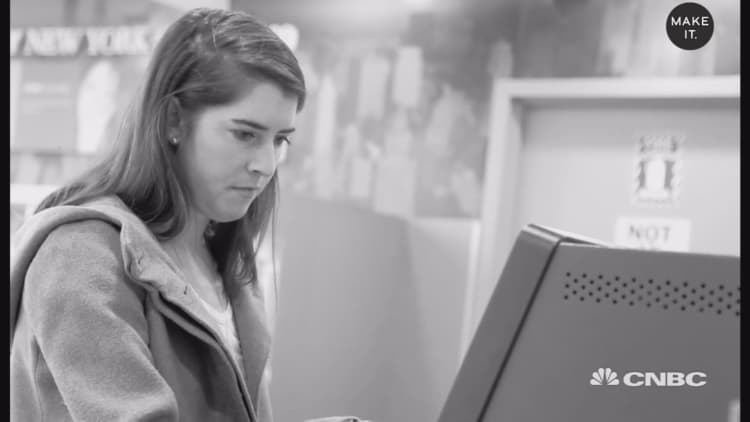On January 1, 2014, I decided to stop buying clothes. And I mean fully stop. I didn't have a list of items I was allowed to purchase and I didn't make exceptions for anything – not even during my nine months of pregnancy.
The rules of my self-imposed ban were as follows: No buying any clothing, which includes shoes, coats, jewelry, accessories, socks, hats, belts, underwear, and of course, any and all clothes! Really I could've just said "no buying clothes," but I felt like making a list.
Three years later, I finally capitulated to pressing need and bought a new pair of winter boots.
More from Mrs. Frugalwoods:
Why I Haven't Purchased Any Clothes in 2.5 years (and counting)
The Joy That Comes When Less Is Enough
How Insourcing Strengthened Our Marriage
Am I going to buy a bunch of clothes now? Nope. I bought one item out of necessity, but my plan is to continue on with the ban for as long as possible. I imagine I'll need to buy something else pressing at some point. But until that day comes, consider me re-banned. Perhaps I can go another three years!
Here's what I've learned you should do if you want to cut back on shopping or on spending in general.
1. DON'T SET AN END DATE
When I undertook this self-imposed, all-encompassing clothing ban lo those three years ago, I didn't set an end date. Much like my lifelong frugality, which I have no intention of ceasing, I entered my clothes-buying-ban with the same mindset. If I'd had an end date, I know I would've hoarded a list of clothing "necessities" to buy the minute my prescribed time-frame ended.
End dates encourage us to view our efforts as deprivation. If whatever new enterprise we're undertaking (a diet, a budget, a clothing ban) has a pre-determined end date, that must mean it's not sustainable and enjoyable for the long-term.
Conversely, if we tell ourselves that it's simply a new aspect of how we live, we'll look for ways to make the change permanent and tenable. Perhaps I'm merely playing psychological tricks on myself, but I really don't care because it works.
In the absence of an end date, I fully incorporated the no-clothes-buying mentality into my lifestyle. It became an element of who I am and, ultimately, a habit. What this ban taught me is that we do almost everything out of habit. I was buying clothes on a monthly, if not weekly, basis purely out of habit. Not because I legitimately needed anything and not because anyone was forcing me to – but because I always had.
These habitual practices are so easy to slip into and remarkably difficult, though not impossible, to break.
2. ALLOW YOURSELF NO EXCUSES
I decided to assume the mantle of this ban with zero excuses. I have plenty of clothing and I knew that any excuses, such as a wedding to attend or a conference or a family reunion or pregnancy, would be nothing more than thinly veiled ways for me to weasel out of the ban, rush to the thrift store, and stock up on new-to-me clothes.
When I started the ban, I wasn't pregnant and didn't know I'd be pregnant a year or so later. But since I'd internalized the "no excuses" mentality, I was determined to maintain the ban despite my growing bump. To meet my needs for maternity clothes, I sought out hand-me-downs. In so doing, I didn't have to purchase a single maternity outfit or nursing top.
My maternity clothes weren't necessarily the height of fashion. Some were pretty worn out, many weren't exactly my size, but I made them work. I saw no reason to break my ban for items I'd only be wearing for a few short months. And now, a pregnant friend is wearing a bunch of my maternity clothes, which have been through countless mamas, but are still going strong.

Much like end dates, I find that excuses and exceptions to a rule are a slippery slope. If, for example, I was allowed to buy only "necessary" clothes, I'd find a way to rationalize cute shoes as "necessary."
3. REALIZE THAT FEW THINGS IN LIFE ARE TRUE NECESSITIES
I used to think new work clothes were a necessity because I needed to look good for my job. But that wasn't true. Yes, I needed to look good for my job and yes, I enacted this ban while working in a professional office in Boston. But I didn't need new clothes in order to accomplish this.
I'd been working for close to eight years when I started this ban, ergo, I already owned plenty of clothes to wear to work. Plus, no one cares what you wear as much as you care.
Not a single person, not even my close friends, noticed that I'd stopped buying clothes and I still got plenty of compliments on my outfits. If you think I'm kidding, try a little experiment: Wear the exact same outfit to work two days in the same week, perhaps on a Monday and a Thursday. I can almost guarantee you that no one will notice or care.
Not even my close friends noticed that I'd stopped buying clothes and I still got plenty of compliments on my outfits.
I was using my job as an excuse to validate my unnecessary shopping. In doing so, I was subconsciously thwarting myself by, in essence, paying to work. The money we expend in service of maintaining a job – be it on our clothes, lunches out, drinks after work, our commute, take-out because we're too tired to cook dinner, a house cleaner because we don't have time to clean – is easily justified because we need it in order to do our job. But do we really? Or are we simply further entrenching our need for our job?
There's absolutely nothing wrong with working a job because you enjoy it – in fact, that's what I'm doing right now. What's scary, however, is putting yourself in a position where you must work because you otherwise can't afford your lifestyle.
You want to work a job because you want to, not because you must.

I used to create justifications for spending in quite a few areas of my life. I "needed' an expensive haircut in order to look professional, I "needed" restaurant meals to treat myself after a long week at work, and I "needed" Starbucks on weekday afternoons to keep me chugging along at my desk.
I'd built up scenarios in my mind where these things constituted requirements for my lifestyle.
And that's key: These were requirements for a lifestyle that I'd created, that I'd imposed upon myself, and for which I was paying dearly and not deriving much joy from. They were not, as it turns out, requirements for a happy life.
4. RELY ON YOURSELF, NOT YOUR THINGS
Aside from saving money, I had a second, weightier goal for my clothes-buying-ban: I wanted to decrease my obsession with my appearance.
When I stopped shopping, I actually felt more confident because I wasn't relying on my clothes to build me up and speak for me.
5. APPRECIATE WHAT YOU HAVE
Before the ban, I'd rifle through my closet and complain that I had "nothing to wear." I honestly don't think I've uttered those words a single time since the start of the ban. Instead of seeing my possessions from the viewpoint of deprivation, I see the abundance of what I have.
When I stepped off the carousel of consumerism and stopped trying to keep up with changing fashions, I started dressing in clothes that I enjoy wearing. I stopped wearing heels except on rare special occasions and I stopped wearing tight, itchy, or otherwise uncomfortable outfits. What's the point?
Trying to keep up with ever-changing fashions is one of the most insidious elements of lifestyle inflation because styles change every few months. The fashion industry will happily induce us to overhaul our wardrobes four times a year, if not more.
Be conscious about the possessions you allow to enter your life.
Be conscious about the possessions you allow to enter your life and, if you no longer need something, don't discard it carelessly. Find a friend who is interested in your hand-me-downs or connect with a Buy Nothing Group or donate to a thrift store.
As part of my new philosophy on clothing, I cleaned out my closet and donated massive piles of clothes I hadn't worn in years. I let go of being controlled by my clothing. And I started taking better care of the clothes I own – after all, I want them to last.
While I've saved an untold amount of money, I estimate several thousand dollars, cut down on the clutter in my closet, and reduced my vanity, perhaps the thing I'm most grateful for is the mindfulness that resulted from my ban. Instead of seeing my clothes as shabby or out of fashion, which they probably are, I'm thankful that they keep me warm and allow me to do the things I love. I've radically changed my perspective from one of self-centered greed to one of acceptance for the imperfections in my life and gratitude for everything I'm blessed to have.
Mrs. Frugalwoods (a pseudonym) writes at www.frugalwoods.com about her journey as an ex-urban, rookie homesteader finding contentment on 66 acres in Vermont with her husband, daughter, and dog. Joyful, extreme frugality made their dream a reality.
A more extensive version of this piece originally appeared on frugalwoods.com.


